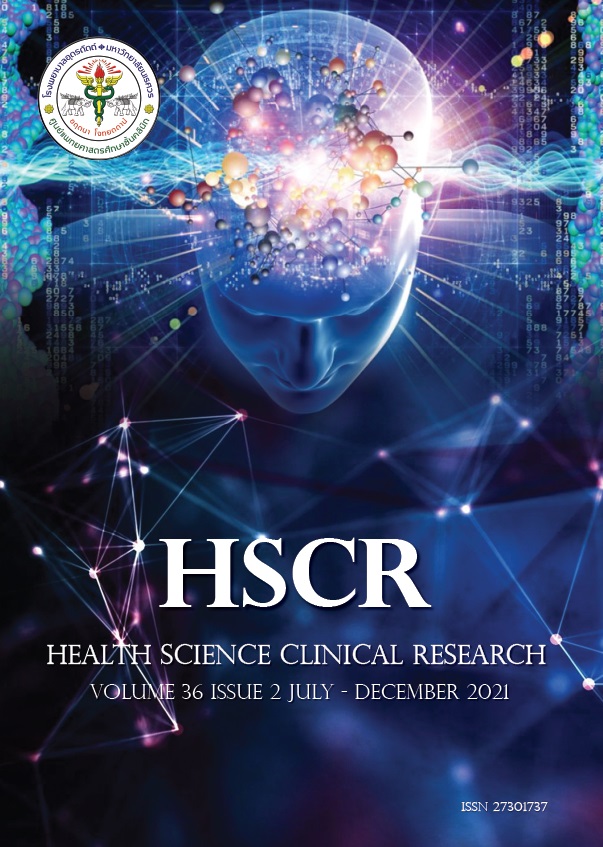เปรียบเทียบการใช้ MEWS กับ SOS score ในการประเมินผู้ป่วย Pneumonia รายใหม่ หอผู้ป่วยอายุรกรรมชาย โรงพยาบาลอุตรดิตถ์
DOI:
https://doi.org/10.1016/hscr.v36i2.252495Keywords:
Comparison of MEWS,, SOS score,, New Pneumonia patientAbstract
Abstract
Introduction : Sepsis is a critical and emergency condition requiring medical attention. Urgent because if treatment is not timely There will be a high mortality rate. This is due to delayed diagnosis and inadequate exposure to antibiotics. Septic shock is a major complication. With the majority of patients diagnosed with Pneumonia, the research team was interested in studying the results of using an Search out severity score (SOS) compared with Modified Early Warning Score (MEWS) to assess pre-crisis symptoms in patients with sepsis. How are they different to find tools that are suitable for specific diseases that prevent adverse events promptly.
Objective : To compare the duration of detection sepsis in new Pneumonia patients using SOS score, compared the MEWS score for pre-critical symptom evaluation.
Methods : It is an intervention study in the form of historical control in the male medical ward, Uttaradit Hospital. Between May 2019 - April 2020, the SOS score trial and the comparison group used the MEWS score to assess early detect sepsis. The patient was followed for 7 days to monitor the occurrence of sepsis. Collect general information Patients using SOS score were retrospective patients from medical records, and patients with MEWS score were new, forward-aggregated patients that analyzed two baseline comparisons using exact probability and t-test statistics. analyze Presented by Graph Kaplan Meier.
Results : There were no differences in the general data for both subjects. Use of SOS score in Pneumonia patients was able to assess the condition. Sepsis in Pneumonia faster than using MEWS score by approximately 2 in 3 (HR = 1.51,95% CI = 1.06-2.12, P = 0.023).
Conclusions : The use of the SOS Score guidelines should be encouraged to continually evaluate new Pneumonia patients, and expand the results of use in agencies with similar characteristics to be able to able to assess and help patients promptly prevents Severe Sepsis and Septic Shock.
Keywords : Comparison of MEWS, SOS score, new Pneumonia patient
References
2. จิตรลดา พิมพ์ศรี. (2559). เปรียบเทียบผลการใช้ Search out severity score (SOS) กับ Modified Early Warning Score (MEWS) ในผู้ป่วยที่มีการติดเชื้อในกระแสเลือด หอผู้ป่วยอายุรกรรมชาย โรงพยาบาลหนองบัวลำภู. โรงพยาบาลหนองบัวลำภู กระทรวงสาธารณสุข.
3. สมไสว อินทะชุบ, ดวงพร โพธิ์ศรี และจิราภรณ์ สุวรรณศรี. (2560). ประสิทธิผลการใช้ MEWS (SOS Score) ต่อการเกิด Severe Sepsis and Septic Shock ในผู้ป่วย Sepsis กลุ่มงานอายุรกรรม โรงพยาบาลอุดรธานี. วารสารการแพทย์โรงพยาบาลอุดรธานี. 25 (1) : 85-92.
4. สมาคมเวชบำบัดวิกฤต. (2558). การดูแลรักษาผู้ป่วย Severe Sepsis และ Septic Shock แนวทางเวชปฏิบัติ. กรุงเทพฯ : สมาคมเวชบำบัดวิกฤต.
5. Naomi. E., et al., (2013). The effect of implementing a modified early warning scoring (MEWS) system on the adequacy of vital sign documentation. Australian Critical Care. 26: 18– 22.
6. Peris A et al., (2012). The use of Modified Early Warning Score may help anesthesists in postoperative level of care selection in emergency abdominal surgery. Minerva Anestesiol. 78(9):1034-8.
7. Mehtap Bulut, et al., (2013). The comparison of modified early warning score with rapid emergency medicine score: a prospective multicentre observational cohort study on medical and surgical patients presenting to emergency department. Emergency Medicine Journal: 476-481.
Downloads
Published
How to Cite
Issue
Section
License
The names and email addresses entered in this journal site will be used exclusively for the stated purposes of this journal and will not be made available for any other purpose or to any other party.















